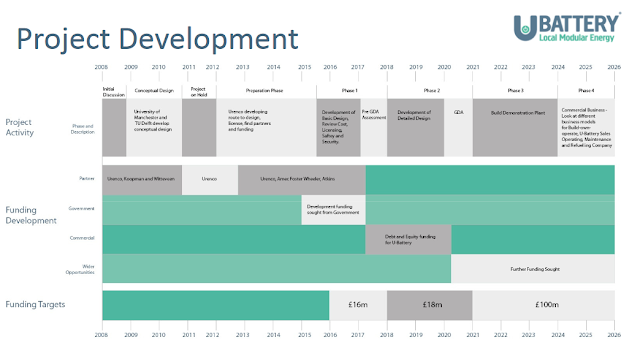4 Megawatt modular micro nuclear reactor is in Canadian pre-license review and targets 2025 for demo reactor
by noreply@blogger.com (brian wang) from NextBigFuture.com on (#2ENY3)
The U-Battery consortium, led by Urenco, has registered its micro-modular reactor technology for pre-licensing vendor design review with the Canadian Nuclear Safety Commission (CNSC).
U-Battery is a 'micro' nuclear reactor which will be able to produce local power and heat for a range of energy needs, mainly targeting the markets for industrial power units and off-grid locations. Powered by Triso fuel, each helium gas-cooled unit produces 10 MWt, can deliver up to 4MWe as electricity and can provide 750 degrees Celsius of process heat. Triso fuel comprises spherical particles of uranium fuel with a triple carbon-coating which effectively gives each tiny particle its own primary containment system.
The concept design of U-Battery was developed by the Universities of Manchester, the Dalton Institute (UK) and the Technology University of Delft (Netherlands) after the project was initiated in 2008 by Urenco. It is being developed by a consortium of Amec Foster Wheeler, Cammell-Laird, Laing O'Rourke and Urenco.
The consortium aims to have a demonstration reactor operating by 2025, and estimates that by the 4th-of-a-kind unit, U-Battery's capital costs will be between 40 and 70 million ($49 and $86 million).


The core technical specifications of U-Battery are:
TRISO fuel is constructed by triple coating spherical particles of uranium fuel. A uranium centre is coated in a layer of carbon, which in turn is coated in silicon carbide, with a further outer layer of carbon.
The structure and spherical shape of TRISO fuel means that it maintains its integrity under extreme conditions. Research has shown that even at temperatures of up to 1800C (200C hotter than assumed accident conditions) the majority of fission products remain inside the TRISO fuel particles, significantly enhancing safety.
TRISO fuel is based on proven technology. It was originally developed in the 1980s and is currently being manufactured in the USA.


Read more










U-Battery is a 'micro' nuclear reactor which will be able to produce local power and heat for a range of energy needs, mainly targeting the markets for industrial power units and off-grid locations. Powered by Triso fuel, each helium gas-cooled unit produces 10 MWt, can deliver up to 4MWe as electricity and can provide 750 degrees Celsius of process heat. Triso fuel comprises spherical particles of uranium fuel with a triple carbon-coating which effectively gives each tiny particle its own primary containment system.
The concept design of U-Battery was developed by the Universities of Manchester, the Dalton Institute (UK) and the Technology University of Delft (Netherlands) after the project was initiated in 2008 by Urenco. It is being developed by a consortium of Amec Foster Wheeler, Cammell-Laird, Laing O'Rourke and Urenco.
The consortium aims to have a demonstration reactor operating by 2025, and estimates that by the 4th-of-a-kind unit, U-Battery's capital costs will be between 40 and 70 million ($49 and $86 million).


The core technical specifications of U-Battery are:
- Twin unit - each unit has an output of 4MW electric, 10MW thermal.
- Gas cooled - helium in primary circuit, nitrogen in secondary circuit (no water).
- TRISO fuel - high integrity. In combination with low absolute power and absence of water eliminates need for multiple back-up safety systems.
- Heat and power source - 710C process heat.

TRISO fuel is constructed by triple coating spherical particles of uranium fuel. A uranium centre is coated in a layer of carbon, which in turn is coated in silicon carbide, with a further outer layer of carbon.
The structure and spherical shape of TRISO fuel means that it maintains its integrity under extreme conditions. Research has shown that even at temperatures of up to 1800C (200C hotter than assumed accident conditions) the majority of fission products remain inside the TRISO fuel particles, significantly enhancing safety.
TRISO fuel is based on proven technology. It was originally developed in the 1980s and is currently being manufactured in the USA.


Read more